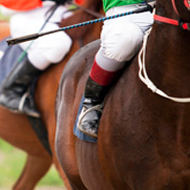Spike in respiratory infections at Newmarket

The spate of infections reportedly forced many trainers to withdraw horses from races over the summer.
A spate of respiratory infections sweeping through Newmarket racing stables this summer has been described by some trainers as the worst they have seen for decades.
The Animal Health Trust (AHT) received 11 respiratory samples from Newmarket racehorses between 10 and 25 August, but test results do not point towards a single causal agent responsible for the infections.
Nasopharyngeal swabs or tracheal washes were analysed for viral and bacterial pathogens using sensitive PCR methods. One sample tested positive for equine herpesvirus-1 (EHV-1) and two others came back positive for the bacteria Streptococcus zooepidemicus.
The AHT said in a statement: 'This latter result is though not unexpected as this organism is commonly carried in the upper respiratory tract by outwardly healthy animals but has been consistently associated with lower respiratory tract disease (inflammatory airway disease or IAD) in young racehorses that can involve large numbers of the bacteria recovered from the trachea, which show evidence of mucus and inflammatory response.'
AHT only received paired blood samples, taken during acute and convalescent phases of disease, from one animal. This showed no evidence of rising antibodies against any of the viral agents - EHV-1, EHV-4, flu, rhinitis viruses and adenovirus, or the bacteria S. equi, which causes strangles.
'Taken together the results do mean that significant diseases such as equine influenza and strangles can with a certain amount of confidence be excluded at least,' the trust added.
No further samples have been sent to the AHT since the end of August; 'the impression we have is that the respiratory infection seems to be resolving,' the statement concludes.
The spate of infections reportedly forced many trainers to withdraw horses from races over the summer.
Angus Gold, racing manager at Shadwell stud in Norfolk, is quoted by the Telegraph as saying: "I don't think people have realised what a difficult year this has been for horse-health issues and just what a tough time trainers have had. It has been the worst year in my 30 years as a trainer."
Biosecurity measures were put in place at the Newmarket Open Weekend (17-18 September) to prevent members of the public spreading infection from one stable to another, according to the Telegraph.
Some in the racing industry believe one possible cause could be the mild winter followed by a cold, wet April. Jenny Hall, chief veterinary officer for the British Horseracing Authority, told the Telegraph: "They normally build up immunity during the winter. They get a bit of a cold and take a bit of time off, just like we do, then they get over it.
"But it may be relevant that this year they've remained reasonably healthy throughout winter and it has eventually caught up with them. They've not had the opportunity to build up that immunity ahead of a more recent colder period."



 Zoetis has launched a new survey to identify management techniques for Equine Herpes Virus (EHV).
Zoetis has launched a new survey to identify management techniques for Equine Herpes Virus (EHV).